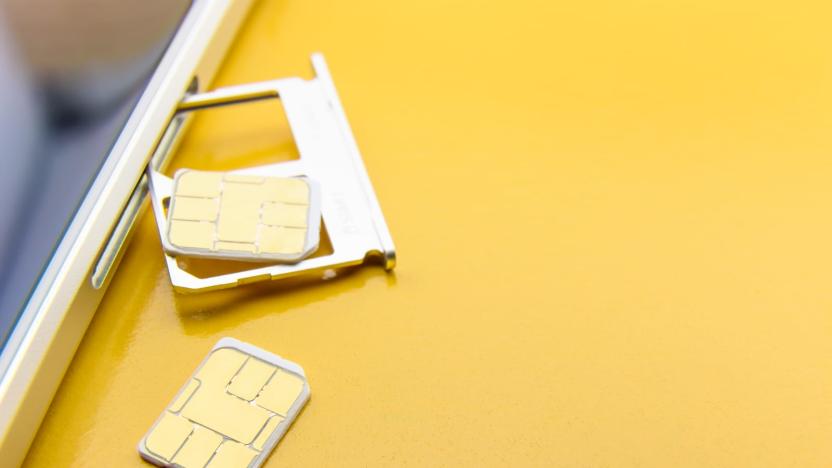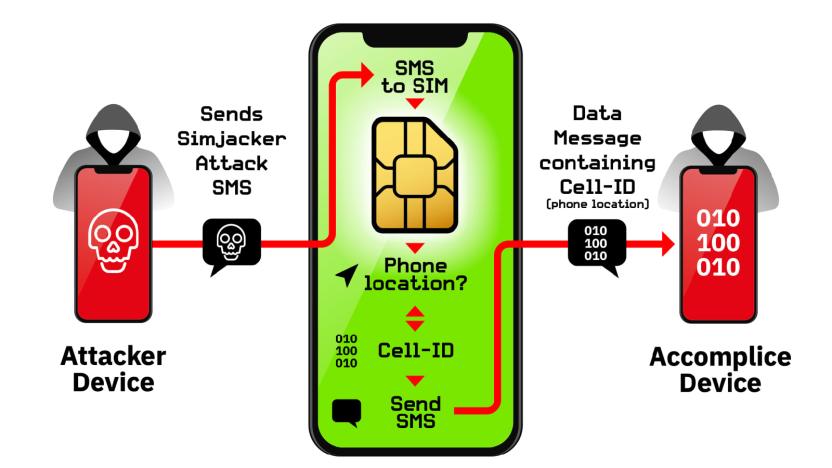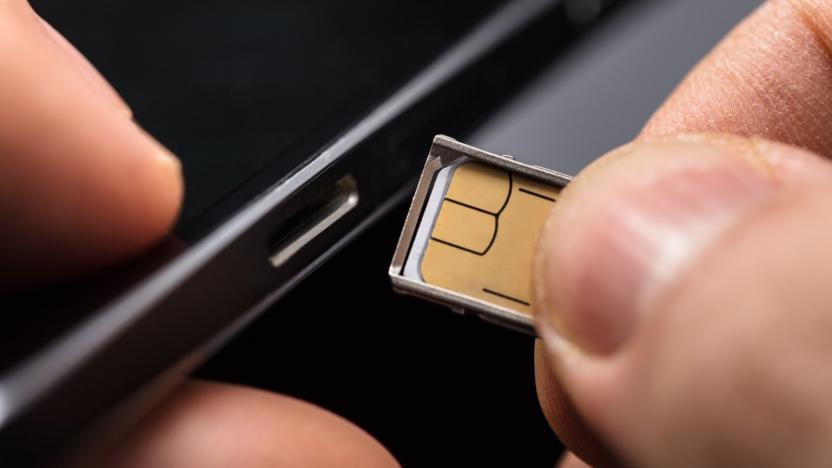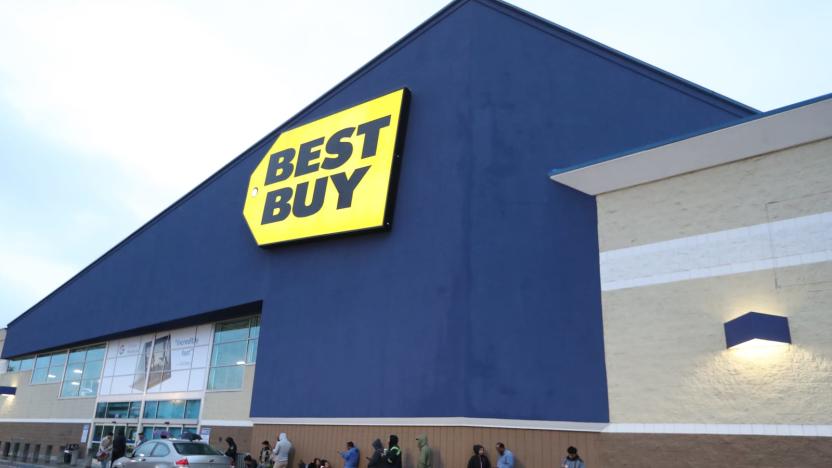sim card
Latest

Second SIM card attack can send texts and phone location data
Simjacker isn't the only SIM-based attack that could put phones at risk. Ginno Security Lab has detailed another exploit, WIBattack, that compromises the WIB (Wireless Internet Browser) app on some SIM cards to take control of key phone functions. Like its counterpart, WIBattack infects a phone through a carefully formatted SMS text that runs instructions on cards that don't have key security features enabled. If successful, the intruders can send texts, start calls, point your web browser to specific sties, display text and send location info.
Jon Fingas09.28.2019
SIM-based attack has been used to spy on people for two years
In a few cases,your SIM card may pose more of a security risk than your phone's software. AdaptiveMobile Security researchers say they've discovered a new vulnerability, nicknamed Simjacker, that's being used to surveil people's devices by an unnamed surveillance company. The technique sends SMS messages containing instructions for an old S@T Browser app supported on some carriers' SIM cards. Where S@T was originally intended to launch browsers, play sounds or otherwise trigger common actions on phones, Simjacker uses it to obtain location info and IMEI numbers that are later sent to an "accomplice device" (again using SMS) that records the data.
Jon Fingas09.14.2019
T-Mobile eSIMs are finally available for regular phone plans
You no longer have to settle for prepaid service if you're a T-Mobile customer hoping to use eSIM support. The carrier has expanded its eSIM support to allow use with postpaid (that is, regular) plans. You now don't have to be quite so picky when you're setting up a second line or freeing up your physical SIM slot for international cards.
Jon Fingas08.28.2019
US charges nine people over $2.4 million SIM hijacking ring
American law enforcement just took down a significant SIM hijacking ring. Federal agents have charged nine men with wire fraud and identity theft charges for participating in The Community, a group that transferred phone numbers to SIM cards in their possession, used those to take control of online accounts (particularly those with two-factor authentication) and promptly stole cryptocurrency. The group has been accused of perpetrating seven attacks that stole more than $2.4 million in digital currencies from targets.
Jon Fingas05.12.2019
Google Fi SIM cards are now on sale at Best Buy
You can now buy Google Fi SIM cards at Best Buy. The product showed up on the retailer's website today and is available at Best Buy's retail stores around the US, as confirmed by a Google Fi employee on Reddit. The SIM cards will cost $10 to purchase, but Google will compensate you with a $10 credit toward your service after the card has been activated.
AJ Dellinger02.11.2019
Daily Roundup: best wearables to buy, socially anxious gaming and more!
In today's Daily Roundup, you'll find out about the top 10 wearables you can buy right now, get the scoop on a video game for the socially anxious and read about one of the most influential samples in music. Find out about all this and more, just past the break.
Dave Schumaker02.20.2015
Engadget Daily: Tesla's Model 3, new buyer's guides and more!
Elon Musk reveals Tesla's latest electric vehicle, we show off our new buyer's guides, discover we still have a lot to learn about stem cells and take a trip to Taiwan with T-Mobile's new global roaming plan. Read on for Engadget's news highlights from the last 24 hours.
Dave Schumaker07.16.2014
The other thing Holland has legalized: carrier-free SIM cards
When it comes to tolerating things that other countries deem illegal, Holland's got previous experience, but this time the nation has approved something that doesn't just benefit glaucoma sufferers. The country has ratified the use of blank SIM cards that aren't tied to a carrier, and can instead be tweaked use whatever network is best for you. The idea is that since you're not tied to an operator, you can switch between providers when your needs change -- allowing you to swerve roaming charges when you're out and about. The move also boosts "internet of things" makers, who can connect devices to cellular networks without signing a long, expensive deal. Of course, the longer-term implication is that smartphone companies like Apple and Samsung could bulk-buy voice and data services and cut out the middle man -- a prospect that would even send John Legere into a cold sweat. [Thanks, Omar]
Daniel Cooper03.17.2014
Isis makes October 22nd mobile payment launch official, vows 20 capable phones by year's end
While we could easily see this coming, it's still good to hear the news more directly: Isis has confirmed that its delayed mobile wallet system will arrive on October 22nd. The company's marketing lead Jaymee Johnson tells us that the NFC-based commerce should start in the previously mentioned Austin and Salt Lake City areas. We haven't been given a formal device list, but "as many as" 20 smartphones should be compatible by the end of the year. We can think of at least four. More details will follow on the day in question, although we already know that the cash-averse will need an Isis app, a special SIM card and compatible SmartTap terminals at stores. That's a lot of conditions that have to be satisfied just to lighten the strain on our pockets -- all the same, we'll take it when the alternatives are moving slowly.
Jon Fingas10.17.2012
Rogers, CIBC may launch Suretap NFC-based payments on October 15th, require a unique SIM
Rogers and Canadian bank CIBC struck a deal for NFC-based mobile payments back in May, long enough ago that it was starting to fade out of the public consciousness. The alliance may be near refreshing our memory with a commercial launch in the cards. MobileSyrup has reportedly scored internal documents that has the two launching their e-commerce collaboration on October 15th under a slightly catchier Suretap name. Unfortunately, the text also suggests that the initial launch will require at least as much hoop-jumping from customers as for the original Google Wallet plans. Avoiding a traditional wallet will demand a BlackBerry Bold 9900 or Curve 9360 on Rogers, a CIBC MasterCard, nearby stores with PayPass terminals, a CIBC app and now a special NFC-enabled SIM card -- a set of criteria that disqualifies almost everyone, especially when there's supposedly a $50 ceiling on transactions. It remains a step forward for mobile payments in a country that has had very few options to start with, but we'd only anticipate widespread adoption once there's a much wider selection of devices and banks.
Jon Fingas10.12.2012
Mobile Miscellany: week of September 10th, 2012
Not all mobile news is destined for the front page, but if you're like us and really want to know what's going on, then you've come to the right place. This past week, C Spire Wireless activated its first LTE networks and we discovered strong indication that Isis will leverage the GSMA's SIM-based NFC standard for its mobile payments system. These stories and more await after the break. So buy the ticket and take the ride as we explore the "best of the rest" for this week of September 10th, 2012.
Zachary Lutz09.15.2012
Uros' Goodspeed hotspot packs 10 SIM cards, says roaming is for chumps (update: fee differences)
Snagging international data service usually involves either special agreements or steep roaming costs. Not Uros and its new Goodspeed hotspot. The pocketable, 21Mbps HSPA+ router carries a staggering 10 SIM cards and simply uses a local SIM for whichever destination country you visit. The brute force strategy helps Uros offer a relatively low flat rate for 1GB of data per day, no matter where you are on the coverage map: while the Goodspeed itself costs €273 ($352), Uros asks just €5.90 ($8) a day for occasional visits and €9.90 ($13) a month for frequent fliers. It's a very sizable bargain for the jetset, even with a current scope limited to Finland, Germany, Italy, Switzerland and the UK. A number of "important" countries are due before Christmas, which could make Uros' hotspot a go-to choice for those who just can't stay settled in one place. [Thanks, Antti] Update: Uros has gotten in touch with us to clarify the pricing beyond what we've seen so far. The €9.90 fee covers account details and doesn't "yet" reflect data -- you'll still need to pay €5.90 per day . There's also a chance the rate could go up in future countries, although all the existing countries abide by that rate.
Jon Fingas09.15.2012
Want to use one of those new nano-SIMs? You'll need one of these
Thinking of hopping on a new contract, but lacking that smaller SIM standard that the iPhone 5 will be packing? You'd best pick up one of these, then. UK carriers, including Three and Vodafone, are already stocking up on these nano-SIMs, and they're also prepping these tiny adapters to ensure the new cards will work across all their devices. These will convert a nano-SIM to both micro and standard sizes, so we'd advise picking one up the same time you visit the phone store. (We've included a glimpse of Vodafone's nano-SIM after the break.) [Thanks Daniel!]
Mat Smith09.13.2012
iPhone 5 confirmed to use nano-SIM, current SIMs not compatible
While Apple was busy announcing the iPhone 5, it left out mention of whether the device would use the recently approved (and Apple-designed) nano-SIM standard. Sure enough, the leaks were right once more -- Apple is relying on that even tinier subscriber module for GSM, HSPA and LTE networks. The company also makes clear that there's no going back, so you'll have to chuck your earlier micro-SIM card if you've got one. Such is the price of progress. [Thanks to Johannes Knapp for the nano-SIM] Myriam Joire and Brad Molen contributed to this report. Check out all the coverage at our iPhone 2012 event hub! %Gallery-165164%
Jon Fingas09.12.2012
Nano-SIM for next iPhone makes appearance ahead of launch?
First we saw a supposed leak of the next iPhone's nano-SIM tray, and now we're seeing alleged photos of the nano-SIM itself. iFun posted an image of what it says is a new T-Mobile nano-SIM that has just started arriving at the German carrier. The package apparently came with a message telling carriers that these SIMs are for smartphones about to go on the market, and that they're not to be given to customers -- yet. Cupertino, of course, tweaked its nano-SIM design earlier this year, and this photo does come ahead of an Apple announcement event rumored for next week.
Sarah Silbert09.04.2012
MasterCard and T-Mobile to bring NFC payments to Europe in Q3 (video)
Poland and Germany could be the next two countries to get smartphone payments, powered by MasterCard and Deutsche Telekom. The SIM-based NFC solution will utilize the US bank's ClickandBuy service for processing and will be available to T-Mobile customers, rolling out to Poland in Q3 of this year and Germany in 2013. This latest partnership comes on the heels of Vodafone's pairing with Visa, which is also said to be making a push for the German market. What remains to be seen is whether or not there is in fact a demand for mobile payments -- the technology has yet to take off in the US, despite an influx of funding and infrastructure from MasterCard and Google. NFC is no doubt the future of cashless transactions, but it likely remains a few years away from hitting the mainstream, with compatible devices still limited, on both the customer and retail fronts. Hit up the links below for a closer look at DT's push to conquer the European market, one NFC-equipped SIM card at a time. Then jump past the break for a quick intro, compliments of Deutsche Telekom CEO Rene Obermann and MasterCard CEO Ajay Banga (the two seemingly random gentlemen that you may have noticed above as well).
Zach Honig07.02.2012
Apple and Liquidmetal hug it out, lengthen their pact until 2014
The deal between Apple and Liquidmetal was originally supposed to be a short-term fling. Technically, it expired in February this year, less than two years after the couple first met. There must have been a spark, as the two have just decided to extend their licensing deal through to February 2014. Of course, simply having a deal isn't the same as putting it to use, and there's no certainty that we'll see anything exotic materialize out of it: the last time Liquidmetal's extra-sturdy alloy was used in an Apple product, it wound up in a SIM card ejector tool. Still, Apple must have found something it wants to make in order to keep its union going forward, whether it's another tiny pack-in with an iPhone or (once costs allow) something a tad larger.
Jon Fingas06.19.2012
New smaller SIM format gets standardized, shrinks 40 percent (update: Nokia gives bitter OK)
ETSI has given the nod to a new SIM format standard, which will be 40 percent smaller than the existing micro-SIM design. Agreeing to the design in Osaka, Japan, the shape will be 12.3mm by 8.8mm and will measure the same thickness as existing SIMs at 0.67mm thick. The design promises to work with existing hardware and appears to fly closer to Apple's suggested size, following plenty of crossed words between manufacturers over the next iteration of the card. Update: Nokia has since put out a statement saying it will honor ETSI's decision and license out the needed patents on fair terms after the standards group made sure the vote was fair. We detect more than a small number of sour grapes from Espoo over having its own design rejected, though: it still sees Apple's nano-SIM as "technically inferior" and thinks the existing micro-SIM will still be the "preferred option." We can think of a couple of reasons why Nokia might not be so keen to switch. [Thanks Prodan] Jon Fingas contributed to this report.
Mat Smith06.01.2012
AGA's iTotal Control range cooker packs GSM connectivity, lets you pre-heat via SMS or web
There are many options available if you want to control your appliances over WiFi, but how about an oven with its own SIM card and phone number? That's exactly what AGA has done with its latest kitchen-oriented offering, the iTotal Control range cooker. Regardless of whether you're cooking in one, or all three of its ovens, sending an SMS message to this smart appliance lets you control each one. It even texts you back to confirm whether your commands like "baking oven on" successfully initiate. The cooker naturally works over WiFi as well, giving you an on-screen emulation of its control panel on either your computer's web browser or AGA's iOS and Android apps. An external GSM remote access device -- basically a router / modem -- connects to the appliance to make it all happen, with cellular service provided by Orange. Ready to get cooking? The iTotal Control is set to sell for a hefty base-price of £10,090 (~$15,826), and you'll also be tied to a one-year contract with Orange for £5.95 (~$9) a month to enable the texting functionality. Simmer over the details at the source link below.
Joe Pollicino05.29.2012
Apple patents ejectable SIM card tray as nano-SIM battle rages on
We're guessing it's just coincidental timing here, but it looks as if Apple has been granted a patent surrounding "ejectable component assemblies" that are designed to be "flush with the external surfaces of the housings of the devices, despite variations in their manufacture." In other words, a SIM card tray. Granted, there's no specific verbiage in the independent claims of this one letting us know what exact size we're talking about, so it's highly unlikely that a patent application filed in December of 2010 (but granted today) would be directly referencing the nano-SIM war that's currently ongoing. That said, the description most certainly sounds like the tray that we've seen throughout the iPhone's life cycle, and if Apple's trying to go small in future handsets, there's a better than average chance that the ejection mechanism will be all too familiar. Legalese lovers can find the usual load down in the source link.
Darren Murph03.27.2012